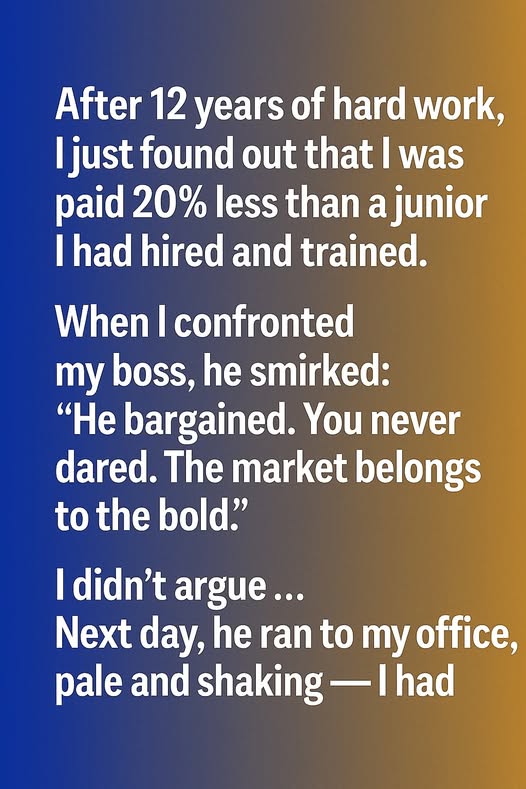
After twelve years of hard work, I just found out that I was being paid 20% less than a junior I had personally hired and trained.
For a moment, I thought it was a mistake. Surely, after more than a decade of loyalty, countless late nights, and mentoring dozens of new employees, my value couldn’t be less than someone who had been there for just over a year.
But the numbers didn’t lie.
When I confronted my boss about it, he didn’t even look surprised. Instead, he leaned back in his leather chair, gave me a smug little smirk, and said,
“He bargained. You never dared. The market belongs to the bold.”
I just stood there, silent. My jaw tightened, but I didn’t argue.
Because in that moment, I realized something: he wasn’t just dismissing me — he was teaching me a lesson, and not the kind he intended.
So I nodded, turned around, and walked out of his office without another word.
The Plan
That night, I didn’t sleep. I sat at my desk at home, surrounded by years of company files, project plans, and emails — all the evidence of the work I’d poured into that place.
Every major client relationship, every new initiative, every innovative process that had boosted the company’s numbers — I had my fingerprints on it.
But what hit me the hardest wasn’t the money. It was the betrayal. The quiet realization that in his eyes, my loyalty had been a weakness.
So, I made a decision.
I wasn’t going to beg.
I wasn’t going to fight for scraps.
I was going to walk away — but not empty-handed.
The Next Morning
The next day, I went to work as usual. I greeted everyone, smiled, and even joined the morning coffee chat. No one could tell that by lunchtime, I’d already started executing my quiet exit strategy.
By the afternoon, I had cleared my personal files, backed up my records, and drafted my resignation letter.
But I also sent one more email — to a close friend of mine at a rival firm. A company that had been trying to recruit me for years, one that truly valued experience and leadership.
When I left that evening, I didn’t say goodbye.
The Shock
The following morning, my boss came running into my office — pale, shaking, and completely thrown off guard.
“Where are the client reports?!” he stammered. “The system’s empty, the updates are gone, and no one has access to the new automation protocols!”
I looked up calmly. “Oh, those? They’re not company property. I developed those independently — on my own time. You remember, right? I even sent you the documentation.”
His eyes widened. He did remember. He had ignored my email months ago about the development rights, brushing it off like everything else I’d done.
And then came the next blow — the phone calls.
Three of our biggest clients had just terminated their contracts. They were following me to the new firm.
The Turnaround
Within a week, I was sitting in a new office — bigger, brighter, and filled with people who respected my input. The rival firm offered me a 35% salary increase, full creative control, and even made me director of a new division.
Meanwhile, my old company was in chaos. My former boss called several times — at first politely, then desperately.
“I think we can renegotiate,” he said once.
“I think you’ve already taught me enough about negotiation,” I replied, and hung up.
Six Months Later
It took less than half a year for his company to crumble.
Without the trust of clients and the guidance of experienced staff, the projects started collapsing. Rumors spread. Talented employees left one after another — many of them joining my team.
One evening, I ran into him at a business conference. He looked exhausted, older, and defeated.
He approached me quietly, no arrogance left in his voice. “You were right,” he said. “Loyalty shouldn’t have been punished.”
I smiled politely. “It’s not about punishment,” I said. “It’s about respect. The market belongs to the bold, remember?”
He nodded slowly, understanding the irony of his own words.
The Lesson
As I left that night, I realized something profound.
In business — and in life — being humble and hardworking is good, but being silent about your worth is dangerous.
People don’t always see your value until you take it somewhere else.
Sometimes, walking away isn’t weakness. It’s the boldest move you can make.
Because yes — the market belongs to the bold.
But so does the victory.
Moral of the Story
Don’t let loyalty blind you to your own value.
Don’t let fear of confrontation cost you your worth.
And never, ever let someone convince you that being kind means being silent.
Sometimes, the best revenge isn’t anger —
It’s success.



